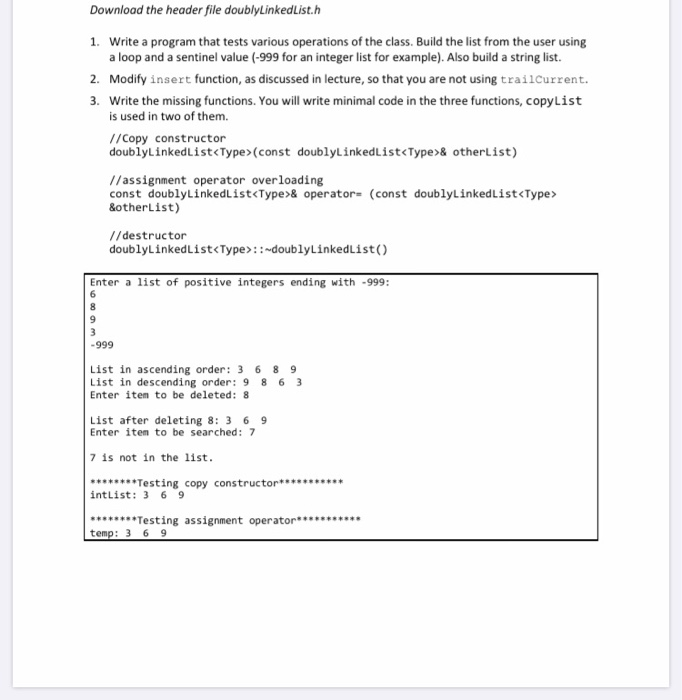Answered step by step
Verified Expert Solution
Question
1 Approved Answer
//COSC 2437 - Lab 5 - Posted #ifndef H_doublyLinkedList #define H_doublyLinkedList #include #include using namespace std; template class doublyLinkedList { protected: struct nodeType { Type
//COSC 2437 - Lab 5 - Posted
#ifndef H_doublyLinkedList
#define H_doublyLinkedList
#include
#include
using namespace std;
template
class doublyLinkedList
{
protected:
struct nodeType
{
Type info;
struct nodeType *next;
struct nodeType *back;
};
int count;
nodeType *first; //pointer to the first node
nodeType *last; //pointer to the last node
private:
void copyList(const doublyLinkedList& otherList);
//Function to make a copy of otherList.
//Postcondition: A copy of otherList is created and assigned
// to this list.
public:
const doublyLinkedList& operator=
(const doublyLinkedList &);
//Overload the assignment operator.
void initializeList();
//Function to initialize the list to an empty state.
//Postcondition: first = NULL; last = NULL; count = 0;
bool isEmptyList() const;
//Function to determine whether the list is empty.
//Postcondition: Returns true if the list is empty,
// otherwise returns false.
void destroy();
//Function to delete all the nodes from the list.
//Postcondition: first = NULL; last = NULL; count = 0;
void print() const;
//Function to output the info contained in each node.
void reversePrint() const;
//Function to output the info contained in each node
//in reverse order.
int length() const;
//Function to return the number of nodes in the list.
//Postcondition: The value of count is returned.
Type front() const;
//Function to return the first element of the list.
//Precondition: The list must exist and must not be empty.
//Postcondition: If the list is empty, the program terminates;
// otherwise, the first element of the list is returned.
Type back() const;
//Function to return the last element of the list.
//Precondition: The list must exist and must not be empty.
//Postcondition: If the list is empty, the program terminates;
// otherwise, the last element of the list is returned.
bool search(const Type& searchItem) const;
//Function to determine whether searchItem is in the list.
//Postcondition: Returns true if searchItem is found in the
// list, otherwise returns false.
void insert(const Type& insertItem);
//Function to insert insertItem in the list.
//Precondition: If the list is nonempty, it must be in order.
//Postcondition: insertItem is inserted at the proper place
// in the list, first points to the first node, last points
// to the last node of the new list, and count is
// incremented by 1.
void deleteNode(const Type& deleteItem);
//Function to delete deleteItem from the list.
//Postcondition: If found, the node containing deleteItem is
// deleted from the list; first points to the first node of
// the new list, last points to the last node of the new
// list, and count is decremented by 1; otherwise an
// appropriate message is printed.
doublyLinkedList();
//default constructor
//Initializes the list to an empty state.
//Postcondition: first = NULL; last = NULL; count = 0;
doublyLinkedList(const doublyLinkedList& otherList);
//copy constructor
~doublyLinkedList();
//destructor
//Postcondition: The list object is destroyed.
};
template
doublyLinkedList::doublyLinkedList()
{
first= NULL;
last = NULL;
count = 0;
}
template
bool doublyLinkedList::isEmptyList() const
{
return (first == NULL);
}
template
void doublyLinkedList::destroy()
{
nodeType *temp; //pointer to delete the node
while (first != NULL)
{
temp = first;
first = first->next;
delete temp;
}
last = NULL;
count = 0;
}
template
void doublyLinkedList::initializeList()
{
destroy();
}
template
int doublyLinkedList::length() const
{
return count;
}
template
void doublyLinkedList::print() const
{
nodeType *current; //pointer to traverse the list
current = first; //set current to point to the first node
while (current != NULL)
{
cout info
current = current->next;
}//end while
}//end print
template
void doublyLinkedList::reversePrint() const
{
nodeType *current; //pointer to traverse
//the list
current = last; //set current to point to the
//last node
while (current != NULL)
{
cout info
current = current->back;
}//end while
}//end reversePrint
template
bool doublyLinkedList::
search(const Type& searchItem) const
{
bool found = false;
nodeType *current; //pointer to traverse the list
current = first;
while (current != NULL && !found)
if (current->info >= searchItem)
found = true;
else
current = current->next;
if (found)
found = (current->info == searchItem); //test for
//equality
return found;
}//end search
template
Type doublyLinkedList::front() const
{
assert(first != NULL);
return first->info;
}
template
Type doublyLinkedList::back() const
{
assert(last != NULL);
return last->info;
}
template
void doublyLinkedList::insert(const Type& insertItem)
{
nodeType *current; //pointer to traverse the list
nodeType *trailCurrent; //pointer just before current
nodeType *newNode; //pointer to create a node
bool found;
newNode = new nodeType; //create the node
newNode->info = insertItem; //store the new item in the node
newNode->next = NULL;
newNode->back = NULL;
if(first == NULL) //if the list is empty, newNode is
//the only node
{
first = newNode;
last = newNode;
count++;
}
else
{
found = false;
current = first;
while (current != NULL && !found) //search the list
if (current->info >= insertItem)
found = true;
else
{
trailCurrent = current;
current = current->next;
}
if (current == first) //insert newNode before first
{
first->back = newNode;
newNode->next = first;
first = newNode;
count++;
}
else
{
//insert newNode between trailCurrent and current
if (current != NULL)
{
trailCurrent->next = newNode;
newNode->back = trailCurrent;
newNode->next = current;
current->back = newNode;
}
else
{
trailCurrent->next = newNode;
newNode->back = trailCurrent;
last = newNode;
}
count++;
}//end else
}//end else
}//end insert
template
void doublyLinkedList::deleteNode(const Type& deleteItem)
{
nodeType *current; //pointer to traverse the list
nodeType *trailCurrent; //pointer just before current
bool found;
if (first == NULL)
cout
else if (first->info == deleteItem) /ode to be deleted is
//the first node
{
current = first;
first = first->next;
if (first != NULL)
first->back = NULL;
else
last = NULL;
count--;
delete current;
}
else
{
found = false;
current = first;
while (current != NULL && !found) //search the list
if (current->info >= deleteItem)
found = true;
else
current = current->next;
if (current == NULL)
cout
else if (current->info == deleteItem) //check for
//equality
{
trailCurrent = current->back;
trailCurrent->next = current->next;
if (current->next != NULL)
current->next->back = trailCurrent;
if (current == last)
last = trailCurrent;
count--;
delete current;
}
else
cout  Download the header file doublyLinkedList.h 1. Write a program that tests various operations of the class. Build the list from the user using a loop and a sentinel value (-999 for an integer list for example). Also build a string list. 2. Modify insert function, as discussed in lecture, so that you are not using trailCurrent. 3. Write the missing functions. You will write minimal code in the three functions, copy List is used in two of them. //Copy constructor doublyLinkedList
Download the header file doublyLinkedList.h 1. Write a program that tests various operations of the class. Build the list from the user using a loop and a sentinel value (-999 for an integer list for example). Also build a string list. 2. Modify insert function, as discussed in lecture, so that you are not using trailCurrent. 3. Write the missing functions. You will write minimal code in the three functions, copy List is used in two of them. //Copy constructor doublyLinkedList (const doublyLinkedList& otherlist) //assignment operator overloading const doublyLinkedList& operator= (const doublyLinkedList &otherList) //destructor doublyLinkedList::-doublyLinkedList() Enter a list of positive integers ending with -999: -999 List in ascending order: 3 List in descending order: 9 Enter item to be deleted: 8 6 8 8 6 9 3 List after deleting 8: 3 6 Enter item to be searched: 7 9 7 is not in the list. ********Testing copy constructor********** intList: 3 6 9 ********Testing assignment operator******** temp: 369
}//end else
}//end deleteNode
template
void doublyLinkedList::copyList(const doublyLinkedList& otherList)
{
nodeType *newNode; //pointer to create a node
nodeType *current; //pointer to traverse the list
if(first != NULL) //if the list is nonempty, make it empty
destroy();
if(otherList.first == NULL) //otherList is empty
{
first = NULL;
last = NULL;
count = 0;
}
else
{
current = otherList.first; //current points to the
//list to be copied.
count = otherList.count;
//copy the first node
first = new nodeType; //create the node
first->info = current->info; //copy the info
first->next = NULL;
first->back = NULL;
last = first;
current = current->next;
//copy the remaining list
while (current != NULL)
{
newNode = new nodeType; //create the node
newNode->info = current->info;
newNode->next = NULL;
newNode->back = last;
last->next = newNode;
last = newNode;
current = current->next;
}//end while
}//end else
}
template
doublyLinkedList::doublyLinkedList(const doublyLinkedList& otherList)
{
//write the fucntion, 2 lines
}
template
const doublyLinkedList& doublyLinkedList::operator=
(const doublyLinkedList &otherList)
{
//write the function - 4 lines
//make sure you avoid self-copy
}
template
doublyLinkedList::~doublyLinkedList()
{
//write the function, one statement
}
#endif

Language: C++
Step by Step Solution
There are 3 Steps involved in it
Step: 1

Get Instant Access to Expert-Tailored Solutions
See step-by-step solutions with expert insights and AI powered tools for academic success
Step: 2

Step: 3

Ace Your Homework with AI
Get the answers you need in no time with our AI-driven, step-by-step assistance
Get Started


